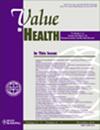模拟在英国大规模推出“少喝酒”应用程序对健康、健康经济和健康不平等的潜在影响。
IF 4.9
2区 医学
Q1 ECONOMICS
引用次数: 0
摘要
目标:酒精对国民保健服务造成了重大负担,但采用具有成本效益的方法仍然很低。数字干预措施可能会克服一些交付障碍。有证据表明,“少喝酒”应用程序可以有效地帮助重度饮酒者减少酒精摄入量。在本研究中,我们估计了大规模推出“少喝酒”应用程序的长期健康影响、成本效益和健康不平等影响。方法:我们使用谢菲尔德酒精政策模型来估计20年时间内两种推出方案的酒精消费、住院率、死亡率和NHS成本的变化:i)大众媒体宣传运动和ii)有针对性地推动将转介到“少喝酒”纳入初级保健。我们在分配成本效益分析中模拟了每种方法的成本效益和不平等影响。结果:据估计,一项大众媒体运动可以使人均酒精消费量减少0.07单位/周,并在20年内避免108,556例住院病例和2,606例死亡,获得24,787个QALYs,为NHS净节省4.17亿英镑。据估计,纳入初级保健每周可减少0.13个单位的消耗,节省188,452人次入院和4,599人死亡,获得38,897个质量年,净节省5.9亿英镑。据估计,这两种情况都能减少卫生不平等现象,初级保健方法的减少幅度更大。结论:估计大规模推出“少喝”应用程序可以改善健康,节省成本,并减少健康不平等。将减少饮酒纳入初级保健可能是更有效的方法。本文章由计算机程序翻译,如有差异,请以英文原文为准。
Modeling the Potential Health, Health Economic, and Health Inequality Impact of a Large-Scale Rollout of the Drink Less App in England
Objectives
Alcohol places a significant burden on the National Health Service (NHS); yet, uptake of cost-effective approaches remains low. Digital interventions may overcome some barriers to delivery. The Drink Less app has evidence of being effective at supporting heavier drinkers to reduce their alcohol intake. In this study, we estimate the longer-term health impacts, cost-effectiveness, and health inequality impact of a large-scale rollout of the Drink Less app.
Methods
We used the Sheffield Alcohol Policy Model to estimate changes in alcohol consumption, hospital admissions, mortality, and NHS costs of 2 rollout scenarios over a 20-year time horizon: (1) a mass media awareness campaign and (2) a targeted drive to embed referral to Drink Less within primary care. We modeled the cost-effectiveness and inequality impact of each approach in a distributional cost-effectiveness analysis.
Results
A mass media campaign is estimated to reduce per capita alcohol consumption by 0.07 units/week and avert 108 556 hospital admissions and 2606 deaths over 20 years, gaining 24 787 quality-adjusted life-years at a net saving to the NHS of £417 million. Embedding in primary care is estimated to reduce consumption by 0.13 units/week, saving 188 452 admissions and 4599 deaths and gaining 38 897 quality-adjusted life-years at a net saving of £590 million. Both scenarios are estimated to reduce health inequalities, with a larger reduction for the primary care approach.
Conclusions
A large-scale rollout of the Drink Less app is estimated to be health improving, cost saving, and reducing health inequalities. Embedding the use of Drink Less within primary care is likely to be the more effective approach.
求助全文
通过发布文献求助,成功后即可免费获取论文全文。
去求助
来源期刊

Value in Health
医学-卫生保健
CiteScore
6.90
自引率
6.70%
发文量
3064
审稿时长
3-8 weeks
期刊介绍:
Value in Health contains original research articles for pharmacoeconomics, health economics, and outcomes research (clinical, economic, and patient-reported outcomes/preference-based research), as well as conceptual and health policy articles that provide valuable information for health care decision-makers as well as the research community. As the official journal of ISPOR, Value in Health provides a forum for researchers, as well as health care decision-makers to translate outcomes research into health care decisions.
 求助内容:
求助内容: 应助结果提醒方式:
应助结果提醒方式:


